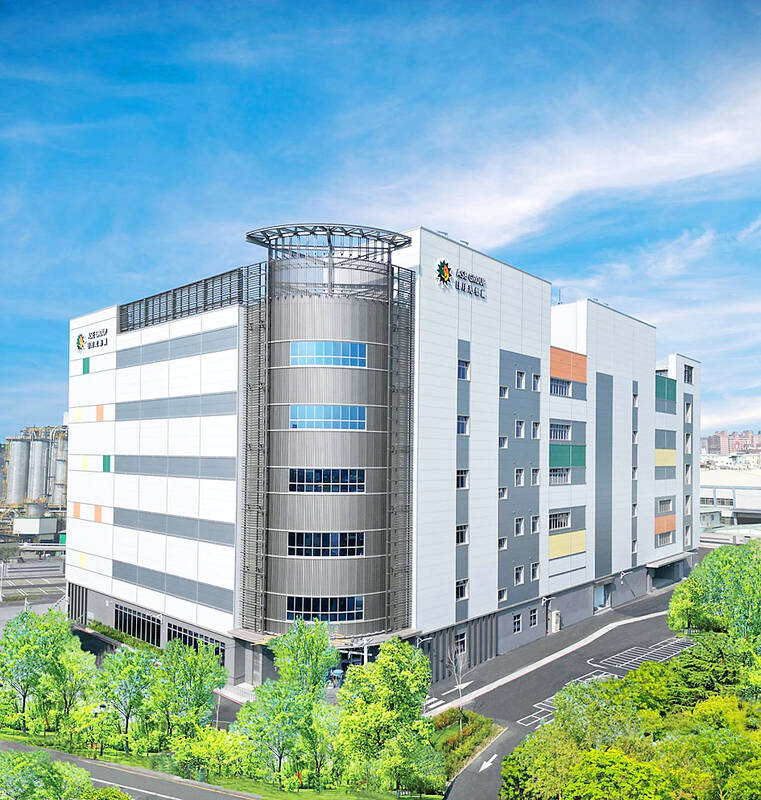ASE Technology Holding Co (日月光投控) yesterday said that its growth momentum would continue this quarter after reporting a 13 percent rise in net profit last quarter from a quarter earlier, its best result this year.
Consolidated revenue this quarter is likely to grow about 3 percent sequentially, benefiting from seasonal upticks and rush orders, with its electronic manufacturing service (EMS) business estimated to grow 12 percent from NT$70.97 billion (US$2.19 billion) last quarter, ASE said.
The company’s core chip assembly and test manufacturing (ATM) business remains under pressure as customers digest inventory and demand remains soft for end devices, with revenue likely to fall 3 to 5 percent from NT$83.68 billion last year, it said.

Photo courtesy of ASE Technology Holding Co
Equipment utilization for ATM services is to drop below the 65 percent of last quarter, it added.
It expects rush orders to keep trickling in this quarter from all segments, as customers are cautious about restocking, ASE said, adding that it would keep its capital expenditure unchanged at US$1 billion.
“We did see a mild seasonal ramp, but not necessarily a rapid recovery for the industry this quarter,” ASE said.
Gross margin for its ATM business would be unchanged at 22 percent this quarter from last quarter, but operating margin for its EMS business might be higher than 3.3 percent this quarter, it said.
“Overall, the situation is stabilizing now,” ASE chief financial officer Joseph Tung (董宏思) told an online investors’ conference.
“We are seeing signs that the [industry] inventory has been consumed and the digestion should be approaching its tail end now,” he added.
That would bode well for ASE to return to annual growth in revenue next year, Tung said.
One of the growth areas is advanced packaging services, specifically from chip-on-wafer-on-substrate (CoWoS)-related advanced packaging services, he said.
Revenue from CoWoS-related packaging services is forecast to double next year from this year, he said.
ASE is collaborating with foundry United Microelectronics Corp (聯電) to produce silicon interposer wafers, a key part of the CoWoS technology, which is used to produce artificial intelligence chips.
ASE’s net profit last quarter expanded to NT$8.78 billion from NT$7.74 billion in the second quarter. On an annual basis, net profit plummeted 50 percent from NT$17.47 billion.
Earnings per share rose to NT$2.04 last quarter from NT$1.8 a quarter earlier, down from NT$4.03 a year earlier.

Semiconductor shares in China surged yesterday after Reuters reported the US had ordered chipmaking giant Taiwan Semiconductor Manufacturing Co (TSMC, 台積電) to halt shipments of advanced chips to Chinese customers, which investors believe could accelerate Beijing’s self-reliance efforts. TSMC yesterday started to suspend shipments of certain sophisticated chips to some Chinese clients after receiving a letter from the US Department of Commerce imposing export restrictions on those products, Reuters reported on Sunday, citing an unnamed source. The US imposed export restrictions on TSMC’s 7-nanometer or more advanced designs, Reuters reported. Investors figured that would encourage authorities to support China’s industry and bought shares

FLEXIBLE: Taiwan can develop its own ground station equipment, and has highly competitive manufacturers and suppliers with diversified production, the MOEA said The Ministry of Economic Affairs (MOEA) yesterday disputed reports that suppliers to US-based Space Exploration Technologies Corp (SpaceX) had been asked to move production out of Taiwan. Reuters had reported on Tuesday last week that Elon Musk-owned SpaceX had asked their manufacturers to produce outside of Taiwan given geopolitical risks and that at least one Taiwanese supplier had been pushed to relocate production to Vietnam. SpaceX’s requests place a renewed focus on the contentious relationship Musk has had with Taiwan, especially after he said last year that Taiwan is an “integral part” of China, sparking sharp criticism from Taiwanese authorities. The ministry said

US President Joe Biden’s administration is racing to complete CHIPS and Science Act agreements with companies such as Intel Corp and Samsung Electronics Co, aiming to shore up one of its signature initiatives before US president-elect Donald Trump enters the White House. The US Department of Commerce has allocated more than 90 percent of the US$39 billion in grants under the act, a landmark law enacted in 2022 designed to rebuild the domestic chip industry. However, the agency has only announced one binding agreement so far. The next two months would prove critical for more than 20 companies still in the process

CHANGING JAPAN: Nvidia-powered AI services over cellular networks ‘will result in an artificial intelligence grid that runs across Japan,’ Nvidia’s Jensen Huang said Softbank Group Corp would be the first to build a supercomputer with chips using Nvidia Corp’s new Blackwell design, a demonstration of the Japanese company’s ambitions to catch up on artificial intelligence (AI). The group’s telecom unit, Softbank Corp, plans to build Japan’s most powerful AI supercomputer to support local services, it said. That computer would be based on Nvidia’s DGX B200 product, which combines computer processors with so-called AI accelerator chips. A follow-up effort will feature Grace Blackwell, a more advanced version, the company said. The announcement indicates that Softbank Group, which until early 2019 owned 4.9 percent of Nvidia, has secured a